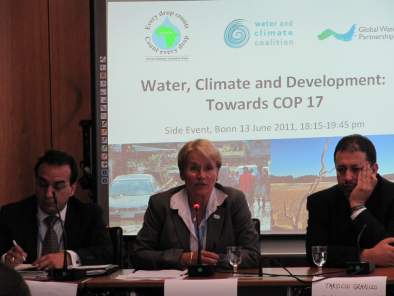“Investments in water management are a no-regret adaptation strategy,” said Dr. Ania Grobicki, Executive Secretary of the Global Water Partnership. She pointed out that the worst effects of climate change-related disasters such as floods and droughts can be avoided with proper water management. At a press briefing earlier in the day, Dr. Grobicki said, “Extreme events such as the floods in Bangladesh in 2007 and Pakistan in 2010 are occurring more frequently, affecting millions of people, ruining crops, and destroying infrastructure worth billions of dollars.”
At the side event, Mr. Elias Freig, Manager of Carbon Finance and Climate Change at the Mexico Commission on Water, pointed out that even though there are references to water in the UNFCCC texts, water is listed with other sectors. “Water is not a sector,” he said, “it’s a cross-cutting resource.” He observed that in the UNFCCC negotiations, adaptation is dealt with separately from mitigation, and he suggested that water has the potential to serve as the link between the two.
The side event, “Water, Climate and Development: Towards COP 17”, organized by Global Water Partnership, the Water and Climate Coalition (WCC) and the African Ministers Council on Water (AMCOW), was held at the United Nations Framework Convention on Climate Change (UNFCCC) conference in Bonn.
At the climate negotiations in Mexico in December 2010, Ecuador called for water to be put on the agenda of SBSTA, the body which provides the UNFCCC with scientific and technological advice. Mr. Tarsicio Granizo of the Ecuadorian delegation explained to the side event participants that water is strongly embedded in the Ecuadorian constitution. Ecuador has taken a lead on advocating water issues within the UNFCCC process.
Mr. Rob Bradley of the Directorate of Energy and Climate Change of the United Arab Emirates spoke about the challenges of water availability faced by the UAE and the strategies that had been put in place to address them. “We need to be better at making the case for water,” he said.
Karin Lexén of the Water and Climate Coalition, of which GWP is a partner, presented recommendations for what the UNFCCC should do as it prepares for the 17th Conference of the Parties in Durban, South Africa, in December. The recommendations include requesting the UNFCCC to consider water issues to be discussed under the SBSTA and to organize a workshop on water.
GWP Press Briefing (webcast on UNFCCC site)
GWP Messages towards COP 17: Call to Action on Water in the Climate Change Negotiations (pdf)
GWP blog (several posts about climate change negotiations)
Global Water Partnership participates in the UNFCCC as an inter-governmental observer organization.
(Photo: Elias Freig, Manager of carbon finance and climate change, Mexico Commission on Water, Dr. Ania Grobicki, Executive Secretary, Global Water Partnership, Tarsicio Granizo, Ministerio Coordinador de Patrimonio, Ecuadorian delegation)

